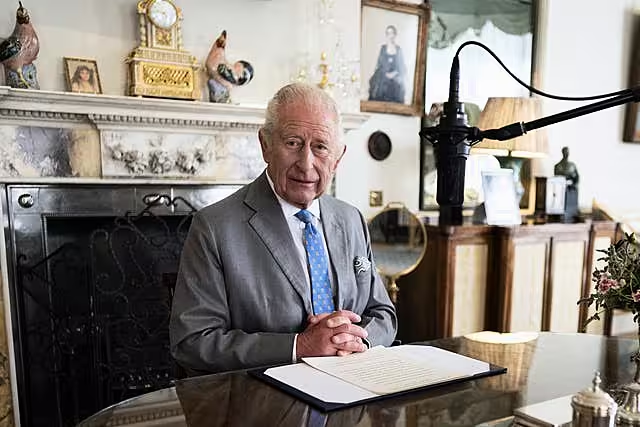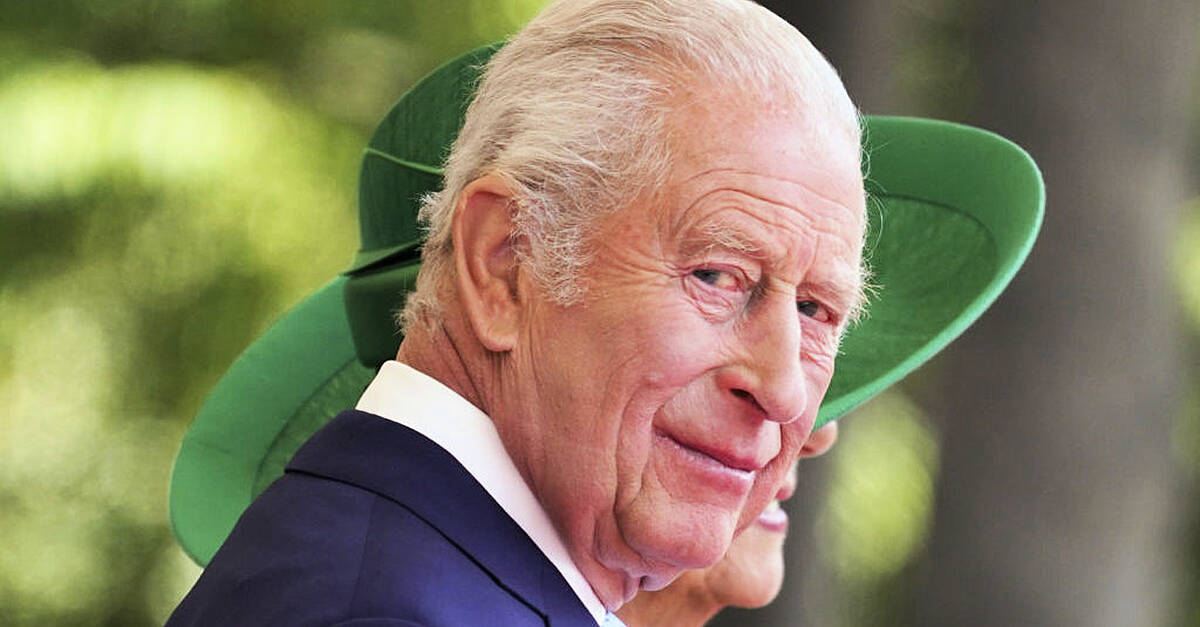Britain’s King Charles has hailed the “courage and camaraderie” of heroes who fought in the Pacific and Far East in “humanity’s darkest hour” as “a flame that shall blaze for eternity” on the 80th anniversary of VJ Day.
Charles also significantly acknowledged the devastation caused by the atomic bombing of Hiroshima and Nagasaki which led to Japan’s surrender, describing the “immense price” on its citizens as one “we pray no nation need ever pay again”.
His reflection on the nuclear attacks, which paved the way for the end of the Second World War, comes at a time of increased concern about the global threat of nuclear conflict.
 Britain’s King Charles recording his message at Clarence House earlier this month (Aaron Chown/PA)
Britain’s King Charles recording his message at Clarence House earlier this month (Aaron Chown/PA)
In an audio message to the UK, realms and Commonwealth, Charles spoke of the horrors faced by allied prisoners of war “who endured years of brutal captivity: the starvation, disease and cruelty that tested the very limits of human endurance”, and the “mental and physical scars” the war left on those who survived.
And he vowed the service and sacrifice of VJ Day heroes “shall never be forgotten”, telling their families and the “sadly dwindling band of veterans”: “Please know that the courage and camaraderie displayed in humanity’s darkest hour is a flame that shall blaze for eternity – a beacon that honours our past and guides our future.”
Charles, in what is believed to be the most direct reference by a British monarch to the suffering in Hiroshima and Nagasaki, said it was right to pause and acknowledge the impact of the “war’s final act” on the people of the Japanese cities.
“Innocent civilian populations of occupied territories faced grievous hardships, too,” he said in the broadcast released at 7.30am on Friday.
Tune in to @BBCOne on Friday as we mark 80 years since victory over Japan, the moment the Second World War finally came to an end.
We are honoured to host the national commemoration at the @Nat_Mem_Arb, and will be joined by veterans who served in the Far East.#VJDay80
1/2 pic.twitter.com/OnxIPaFGJu
— Royal British Legion (@PoppyLegion) August 13, 2025
“Their experience reminds us that war’s true cost extends beyond battlefields, touching every aspect of life – a tragedy all-too vividly demonstrated by conflicts around the world today.
“On this landmark anniversary, we should also pause to acknowledge that in the war’s final act, an immense price was paid by the citizens of Hiroshima and Nagasaki – a price we pray no nation need ever pay again.”
He added: “But in recalling so much suffering, we must not lose sight of how great was the cause and how sweet the victory.”
 The then-Prince of Wales chats to a veteran after the national service of remembrance marking the 75th anniversary of VJ Day at the National Memorial Arboretum in 2020 (Oli Scarff/PA)
The then-Prince of Wales chats to a veteran after the national service of remembrance marking the 75th anniversary of VJ Day at the National Memorial Arboretum in 2020 (Oli Scarff/PA)
VJ Day on August 15 marks the anniversary of the end of the six-year-long war.
Much of the celebration in 1945 focused on VE (Victory in Europe) Day in May, with those who served in the Far East labelled The Forgotten Army.
Iconic aircraft will join the nation’s tribute to veterans of the Far East campaign this Friday. ✈️
Around 400 members of the UK Armed Forces will honour their predecessors on the 80th anniversary of #VJDay, at the National Memorial Arboretum. 🫡 🇬🇧
A tri-service Guard of… pic.twitter.com/18gjQcFODp
— Ministry of Defence 🇬🇧 (@DefenceHQ) August 11, 2025
By 1945, some 365,000 British and 1.5 million Commonwealth troops had been deployed across Asia and the Pacific.
More than 90,000 British troops were casualties in the war against Japan, and nearly 30,000 died, while more than 12,000 Britons were among the 190,000 Commonwealth troops held as Prisoners of War by the Japanese.
Of the Allied forces, the US suffered the greatest losses, with more than 100,000 killed in action.

In Hiroshima and Nagasaki, more than 200,000 people were killed by the US bombs and in the months after succumbing to radiation sickness, the effects of burns and other serious injuries.
Charles described the 80th anniversary as a day of “profound remembrance” and said of his grandfather King George’s VI’s “The war is ended” audio broadcast at the time: “Seldom can a simple message have resonated with such a potent mix of relief, celebration, and sorrow for those who never lived to see the glow of freedom’s new dawn.”
He also painted a vivid picture of when “high above those monsoon-lashed jungles, allied pilots displayed their own fearless bravery, flying fighters, bombers and transport aircraft into enemy fire and nature’s fury”.
This year we mark the momentous milestone of 80 years since the end of the Second World War.
We cannot do so without honouring those who continued to fight and be held in brutal captivity in the Far East and Pacific, long after the VE Day celebrations erupted.#VJDay80
(1/10) pic.twitter.com/IV8bduJdIA
— Royal British Legion (@PoppyLegion) August 11, 2025
The speech made no mention of Charles’ father Prince Philip, the late Duke of Edinburgh, who was in Tokyo Bay on board the destroyer HMS Whelp, a warship he served on as second-in-command, when Japanese officials formally signed the surrender on the USS Missouri on September 2nd, 1945.
